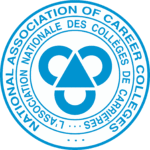Ontario’s childcare sector continues to grow as families, schools, and communities require trained assistants to support early childhood programs. ECAs work alongside registered educators in daycares, early learning centres, and school-age programs, making this career both rewarding and in high demand.
As a program delivered under the National Association of Career Colleges (NACC), this diploma ensures consistent, high-quality training across Canada. The NACC credential is widely respected and assures employers that graduates have met rigorous learning outcomes, from inclusive curriculum design to health, safety, and nutrition practices.
Unlike purely classroom-based programs, our co-op work term provides direct experience in childcare environments. This hands-on training allows you to apply theory, gain practical confidence, and build a professional network—helping you transition seamlessly into employment upon graduation.

At Futures Canadian College, we align educational excellence with practical skill development. Our Mississauga campus equips students for success through quality training, supportive faculty, and strategic exam preparation—all within a nurturing academic environment.
Our mission is to deliver high-quality, career-focused education that equips students with practical skills, recognized credentials, and the confidence to succeed in today’s workforce.
Our vision is to be a leading career college recognized for student success, industry relevance, and strong employment outcomes.
Our Mississauga facility, centrally located in the IT corridor, offers easy access via public transit and major highways, ensuring a seamless learning experience for students across the Greater Toronto Area (GTA).
The NACC Early Childhood Assistant Co-op Diploma prepares students to work alongside educators in childcare settings, providing developmentally appropriate care for children up to age 8. Students will gain a comprehensive understanding of early childhood development, guiding behaviour, inclusive program design, and family/community collaboration. A required co-op work term grounds theory in practice, giving students valuable industry experience.


Students strengthen their learning by practicing with mock scenarios that simulate real-world PSW responsibilities. These sessions allow them to apply theoretical knowledge to hands-on activities, reinforcing essential caregiving and problem-solving skills in a safe and supportive environment. By rehearsing common workplace situations, learners gain the confidence to manage real client care challenges effectively.
Regular review sessions focus on the core areas of client care, safety protocols, and PSW exam content. This structured reinforcement ensures students not only master practical skills but also retain the theoretical foundations required for certification. Emphasis on safety and quality of care helps learners internalize best practices that align with professional standards.
Students also receive step-by-step guidance on completing their PSW clinical logbook and competency checklists. This ensures accurate documentation of their training progress and helps them meet regulatory requirements with confidence. With mentorship and oversight, learners track their skill development and stay prepared for both clinical placements and the final certification process.

Age: Minimum 18 years
Education: Secondary School Diploma (OSSD or equivalent) with at least 60% GPA, or mature student status with a passing Wonderlic test
Interview: Live online or in-person interview with Admissions
Language Proficiency: IELTS 5.5 (or equivalent) for non-native English speakers, or successful ESL completion
Credential Assessment: Certificates or degrees obtained outside Canada must be evaluated for equivalency by WES, ICAS, or CES (University of Toronto)
Foundations of Early Childhood Education
Communications
Infant & Child Development
Observation Skills
Health, Safety & Nutrition
Child, Family & Community
Practicum I
Introduction to Sociology
Play-Based Early Learning Strategies
Language & Literacy
Introduction to Psychology
Guiding Children’s Behaviour
Introduction to early childhood education, roles and responsibilities, foundations of practice
Written and oral communication skills, documentation, and workplace communication
Prenatal, infant, toddler, preschool, and school-age child development stages
Observation techniques, screening tools, and documentation strategies
Health promotion, safety in childcare settings, nutrition planning and practices
Family dynamics, community partnerships, cultural diversity in early learning
Supervised placement focusing on child observation and guided support
Social systems, diversity, and their influence on childhood and families
Curriculum planning, play as a tool for learning, activity implementation
Early language development, literacy-rich environments, and strategies
Psychology principles relevant to early childhood behaviour and learning
Positive guidance techniques, behaviour management, self-regulation strategies
Graduates from our program pursue roles such as:
Submit required academic and ID documentation
Pick your schedule from available class schedules.
Contact our Registrar at (905) 412‑3007 or email info@futurescollege.ca
Attend, train, and get Futures ready!
Online or in-person
(if specifically asked for)
Graduates may advance into roles as Early Childhood Educators (with further study), supervisors in childcare centres, or move into related fields such as educational support and child development services.
“The co-op placement gave me real-world confidence, and I was offered a job at the centre where I trained.”
“FCC’s program was thorough and supportive. I now work in a preschool program and love making a difference every day.”
A: ECAs assist and support Early Childhood Educators but are not registered with the College of Early Childhood Educators (CECE). Many graduates choose to later upgrade to ECE programs.
A: No prior experience is required. The program includes foundational courses and supervised practicum to prepare you.
A: Yes, our certificates/diplomas are globally recognized.
A: Makeup sessions available during next intake or via self-study and catch-up labs.
A: Yes—with conditions. See our student handbook or contact us directly for full details.
If you’re interested in financial support options, we encourage you to visit our Student Resources page for detailed information. You can also connect with our Admissions team, who will be happy to guide you through the available options and answer any questions.
Tuition: CAD $ 1995 (includes lab materials, certification prep, logbook)
Optional Extras:
Price with Discount/ Scholarship- 1495 CAD $ (Terms and Conditions Apply)
Eligible students may benefit from:
Enrollment Tip:Contact our Financial Office early—let us assist you with grants, loans, and sponsorships. Rates (or prices) may vary based on time and conditions.
3465 Semenyk Court Mississauga, ON L5C 4P9
+1 (905) 412 3007
info@futurescollege.ca
Monday to Friday | 10:00 AM to 7:00 PM
Saturdays - 10:00 AM - 2:00 PM
WhatsApp us